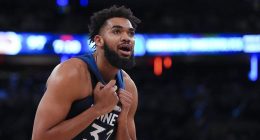[This interview contains spoilers for episode one of Moon Knight.]
Now that Moon Knight has premiered on Disney+, director/executive producer Mohamed Diab is opening up about the fact that he had to go to bat in order to keep his favorite scene in the first episode. The sequence revolves around Oscar Isaac‘s Steven Grant, who’s decided to go on a date with a museum co-worker. However, he doesn’t remember making the date, presumably because his alter, Marc Spector, arranged it instead. To add insult to injury, Steven was two days late for the date since Spector’s latest mission as Moon Knight upended any dinner plans that Steven may have had. Once Steven eventually got his bearings at the restaurant, he decided to go ahead and order the steak that he was supposed to have two days earlier. What followed was both comedic and heartbreaking since Steven, a vegan, had no clue how to order a steak. More importantly, the scene also illustrated just how much he’s struggling with DID [Dissociative Identity Disorder].
“I remember fighting for that [steak] scene. That scene was written by me and [consulting producer] Sarah [Goher], and I knew that I was never going to know Steven unless we had that steak scene,” Diab tells The Hollywood Reporter. “That is the moment when the audience is going to say, ‘It’s the first episode, but I’m in love with this character. It’s done.’ To me, it was very important to find something to express that DID is not just blackouts and then his life is fine and normal. No, no, no. DID is destroying his life, even his romantic life. He can’t have a lover or a normal relationship with anyone because of what he’s been going through. It’s such a black comedy kind of moment, but it’s the moment that the audience can connect to Steven.”
The Egyptian filmmaker is also reflecting on Isaac as a collaborator and how he refused to rest on his laurels.
“Oscar, from the get-go, was not eager just to be hired by Marvel. He had just come from Star Wars, X-Men and Dune. He actually announced a couple of times that he was not going to do any other big movies,” Diab recalls. “Every time Oscar came to the table, he had so many questions: ‘How are we going to do this? How are we going to pull this off? How are we going to make this special?’ He made me work. Any time we were shooting anything, he would always question me, ‘Why are we doing this?’ He wasn’t questioning me; he was questioning the motives of what we were doing. But that made everyone work. All the writers, Marvel and Oscar himself had so much great input.”
In a recent conversation with THR, Diab goes on to elaborate on why he convinced Ethan Hawke to commit to the series before even reading a script.
So when I saw Clash a few years ago, I never could’ve imagined that you’d eventually helm a Marvel project. Were you just as surprised when they showed interest?
No, not at all. By the way, my English is the effect of Hollywood. I learned English from watching so many American movies. I then developed as a filmmaker and started watching international cinema, and that’s how I developed my taste. But even in Clash, Amira or any film that you see in Cannes or Venice, the Hollywood structure is there. So I knew in my heart that one day, I wanted to tell my sole, intimate stories on a bigger scale, and I moved to Hollywood three years ago with that dream. And Clash, as independent as it feels, is what sold me to Hollywood. It felt like, “OK, this guy, with $1 million, made this film that feels like the apocalypse, and it’s all set in one place.” But I would never be able to make a good film unless I absolutely feel that it’s a passion project. I’ve been offered some other superhero films and big-budget films, but I turned them down because I didn’t connect. But with Moon Knight, which I still call a film, I chased it. I wanted to get the job. I fought for it. Me and Sarah [Goher] — my wife, partner and co-writer, who’s also a [consulting] producer on Moon Knight — put together this presentation which covered everything: how to develop the characters, the locations, the editing, the music, the action, everything you can imagine. And that’s how we got the job.

The highest compliment I can pay you is that if the Marvel Studios logo was removed, I think a good number of viewers may not realize that they’re watching something in the MCU. How did you achieve something unique in an established franchise?
That is the best compliment ever. The idea that we took a project in the MCU and made it a standalone film means a lot to me. And by the way, when Oscar was first on board, he told me, “What the hell are you doing here?” (Laughs.) He told me exactly what you were saying about my films. He loved my two films, so I told him, “Making something intimate is not exclusive to budget. We can make a character study here. We can do what we want.” And that’s what we eventually did. So I’m proud of Marvel for giving us the chance to do that. I have to say that it was there in the writing. We definitely developed it a lot, but Jeremy Slater did a great job. The comic books, the origin stories, are so rich. The DID [Dissociative Identity Disorder], the drama in it, and thinking, “Why does [Steven/Marc] have DID? What’s behind all of that?” That gave us a lot of room to create something very unique, something dramatic and funny with action and even horror elements. We were lucky.

My favorite scene is when Steven orders a steak in the first episode. It’s funny on one level because he’s a vegan who doesn’t know how to order a steak, but more importantly, it’s tragic to see how much he’s struggling with DID. What do you remember about developing that moment?
I remember fighting for that scene. That scene was written by me and Sarah, and I knew that I was never going to know Steven unless we had that steak scene. That is the moment when the audience is going to say, “It’s the first episode, but I’m in love with this character. It’s done.” To me, it was very important to find something to express that DID is not just blackouts and then his life is fine and normal. No, no, no. DID is destroying his life, even his romantic life. He can’t have a lover or a normal relationship with anyone because of what he’s been going through. It’s such a black comedy kind of moment, but it’s the moment that the audience can connect to Steven.

Oscar has rather a challenging role since he’s playing multiple characters, and I know he brought in his brother [Michael Hernandez] to read the other side of the Steven-Marc interactions. Did you find other ways to make his life easier during those scenes?
Well, it was a collaboration. Oscar, from the get-go, was not eager just to be hired by Marvel. He had just come from Star Wars, X-Men and Dune. He actually announced a couple of times that he was not going to do any other big movies. So to convince him to do this was to convince him that we were going to do something unique and something really intimate. Every time Oscar came to the table, he had so many questions: “How are we going to do this? How are we going to pull this off? How are we going to make this special?” So he was his two characters’ best lawyer. He made me work. Any time we were shooting anything, he would always question me, “Why are we doing this?” He wasn’t questioning me; he was questioning the motives of what we were doing. But that made everyone work. All the writers, Marvel and Oscar himself had so much great input. And I would say the same thing about Ethan. We created his villain character, Arthur Harrow, completely when he arrived. It wasn’t there. Every step of Arthur Harrow, the judging, his ideology was something that all of us created together. He actually signed on without even reading the script. I told him, “Don’t read the script. Your character is going to be born between our conversations,” and that’s what happened. So I was lucky. I would say the same thing about May Calamawy. Each [lead actor] was the lawyer for their character, and they developed the story so much. And because of them, the story got a lot better.
The audience is going to learn a lot about Egypt and Egyptian mythology through watching Moon Knight. As an Egyptian filmmaker, are there any authentic details that you were particularly proud to include?
As an Egyptian, most of the time that you see Egypt in movies, it’s not Egypt. They’ll shoot a different country for Egypt, but imagine seeing Paris and then seeing Big Ben [London’s The Great Bell] in the back. It hurts. Or it’s shot in a way that shows the pyramids in the desert. If you actually panned just a little bit, the pyramids [at Giza] are in the middle of the city [Cairo]. We call it orientalism when you show people in an exotic and dehumanizing way. And what we did on Moon Knight was the first step of trying to normalize us as human beings, through the Layla (Calamawy) character. It’s very important to see us, and by the end of the show, there’s going to be a couple of surprises about Egypt that are very important. So I would call this a very important first step into understanding our culture a little bit. I also got an Egyptian composer [Hesham Nazih], and one of the three editors is Ahmed Hafez, an Egyptian. Even the rap songs and music that we used were all Sarah’s suggestions. But I’m so proud of it, and I feel like it’s going to give you an experience and a feeling that is unique and different.
Well, I can’t wait to see where the show goes next, especially after episode four’s insanity.
This was one of my favorite interviews, especially because we see eye to eye on the steak scene. I fought so much to keep that scene. It was very important. I don’t want to say it’s my favorite scene in the whole show, but it’s my favorite scene in episode one.
***
Moon Knight‘s first episode is now streaming on Disney+.
Source: Hollywood








